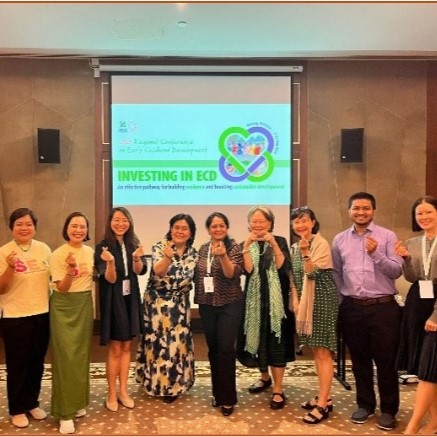The Early Childhood Workforce Initiative (ECWI), under the refreshed theory of change, emphasizes recognizing, preparing, supporting, and empowering early childhood education and care (ECEC) staff. This renewed focus includes significant contributions from early childhood regional network partners like the Asia-Pacific Regional Network for Early Childhood (ARNEC), which prioritize staff mental health and well-being, embedding these themes into pre- and in-service training for ECEC staff.
A recent collaboration between ARNEC and other key regional networks highlights the integration of Social-Emotional Learning (SEL) in the Early Childhood Care and Education (ECCE) workforce, underscoring its importance in promoting the well-being of young children and their educators. The ARNEC pre-conference workshop on SEL, held in Penang, Malaysia, between 27-30 May 2024, attracted over 500 attendees from 48 countries and emphasized SEL's critical role in ECCE settings. This workshop, based on the APETT-SEL Handbook by UNESCO Bangkok, provided participants with practical strategies for integrating SEL into their classrooms, focusing on age-appropriate, culturally inclusive practices, and the importance of a supportive classroom climate.

Similarly, the comprehensive SEL training program for pre-service teachers at the Philippine Normal University, in collaboration with ARNEC, equipped future educators with essential SEL skills. This program featured interactive activities that deepened participants' understanding of SEL concepts, the neuroscience behind emotions, and practical strategies for managing challenging emotions and fostering a supportive learning environment.
The 2024 ARNEC conference also highlighted the importance of resilience in the ECD workforce. The session on Building Resilience in the Early Childhood Development (ECD) Workforce emphasized the integration of SEL into ECEC programs as a key strategy for promoting holistic education models that address both cognitive and emotional development in young children. Presentations showcased successful SEL implementations in various countries, such as the Philippines and Cambodia, demonstrating the positive impact of SEL on educational frameworks.
Representatives from fellow ECWI partners, the African Early Childhood Network (AfECN) and the Arab Network for Early Childhood (ANECD) shared innovative solutions for ECD workforce resilience. AfECN emphasized their focus on professional development and SEL integration to support educators' well-being, while ANECD stressed on knowledge production and advocacy to influence policy. The session addressed challenges like limited resources and varying training levels, highlighting the need for continuous professional development, supportive policies, and regional collaboration. Participants emphasized fostering platforms for knowledge exchange and conducting research to inform policy and practice, enhancing the resilience and effectiveness of the ECD workforce.
ECWI's focus on the ECEC workforce, particularly through the integration of SEL, reflects a commitment to enhancing the well-being and resilience of early childhood educators. The collaborative efforts of ARNEC and fellow ECWI partners are paving the way for a more supportive and high-quality ECD workforce, ultimately contributing to the quality of early childhood education across regions enabling children greater opportunities to thrive.


